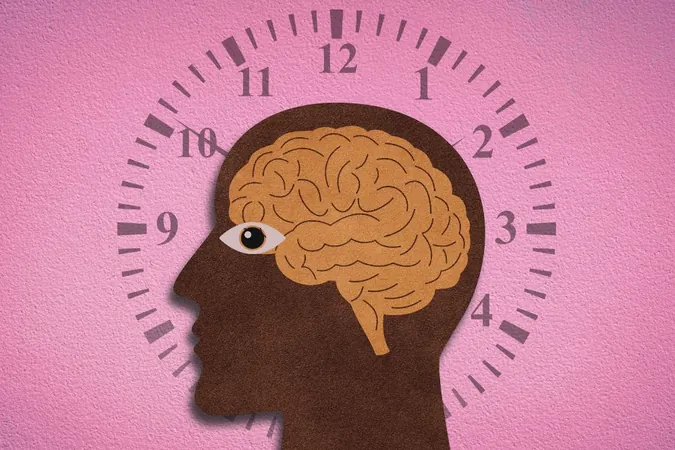
Unlocking the Secrets of Our Biological Clocks: How Circadian Rhythms Impact Your Health
2024-12-24
Author: Wei Ling
As winter descends and the days become shorter, many of us may find ourselves feeling off balance. This seasonal phenomenon is especially challenging for those grappling with Seasonal Affective Disorder (SAD), a form of depression closely tied to our natural sleep-wake cycles. But what if I told you that our biological clocks are responsible for much more than just our mood? Sofia Axelrod, a Research Associate in the Laboratory of Genetics at The Rockefeller University, sheds light on the intricate workings of our circadian rhythms and their staggering influence on overall health.
What Are Biological Clocks and Their Role in Circadian Rhythms?
At their core, biological clocks are genetic programs. Specialized photoreceptors in our eyes evolved to respond to specific spectrums of daylight, sending signals to clock genes in our brains that orchestrate the production of proteins on a 24-hour cycle. It turns out that nearly every cell in our body boasts a set of clock genes, all synchronized with the master clock in our brain. This synchronization ensures a harmonious "orchestra" of bodily functions, with estimates suggesting that 50 to 80 percent of all genes are influenced by circadian rhythms.
When these delicate clocks are disrupted, the consequences can be severe—not only do we face sleep issues, but disruption can lead to heart disease, strokes, obesity, autoimmune diseases, and even cancer. Groundbreaking research indicates that sleep, managed by circadian rhythms, also regulates the permeability of the blood-brain barrier, potentially impacting our health and the efficacy of various treatments.
The Winter Blues: How Light Exposure Affects Our Immune System
During the cold, dark winter months, many people experience an uptick in infections, often attributed to staying indoors. Yet, research suggests that changes in light exposure significantly influence our immune health. Circadian rhythms play a crucial role in the organization of our molecular functions, including the timing of immune responses. For example, at specific times, our bodies limit the release of T cells, crucial for fighting infections. Insufficient light exposure can lead to a "rhythm disruption," affecting the availability of immune cells and increasing susceptibility to illness.
But this isn't merely a winter issue—our lifestyles have increasingly shifted indoors, leading most of us to receive inadequate natural sunlight year-round. Fortunately, bright light therapy can serve as an effective solution, helping to maintain healthy circadian rhythms and bolster immune function.
The Impact of Artificial Light on Circadian Health
The pervasive use of artificial lighting and bright screens in our nighttime routines complicates our circadian system. It is not the presence of artificial light per se that disrupts, but rather the stark contrast between bright days and dark nights. Bright exposure in the morning can mitigate the effects of artificial lighting at night, yet many of us fail to get sufficient morning light. Consequently, we can experience a state of "circadian confusion," leaving our bodies grappling with irregularity.
Tips for Keeping Your Circadian Rhythms in Check
To promote optimal functioning of our biological clocks, it's vital to prioritize morning light exposure. If natural light is lacking, consider using a light therapy box for at least half an hour upon waking. In the evenings, using bright lights can help stave off premature sleepiness. However, dimming the lights about half an hour before your scheduled bedtime can signal to your body that sleep is approaching—and using red light can be beneficial as it doesn’t interfere with your circadian clock.
It's also important to establish a consistent routine. Maintaining regular sleep and wake times, alongside scheduled light exposure and meals, can enhance the natural efficiency of your circadian rhythms. While holidays or weekends may tempt us to deviate, keeping to this regimen ensures a healthier sleep cycle.
Conclusion: Take Control of Your Circadian Health!
In a world filled with distractions and artificial stimuli, taking control of our light environment offers a straightforward strategy to nurture our biological clocks. By prioritizing daylight exposure, establishing consistent routines, and being mindful of our evening light intake, we can optimize our health and well-being, regardless of the season. Don't let your biological clocks run amok—unlock their potential today for a healthier tomorrow!



 Brasil (PT)
Brasil (PT)
 Canada (EN)
Canada (EN)
 Chile (ES)
Chile (ES)
 Česko (CS)
Česko (CS)
 대한민국 (KO)
대한민국 (KO)
 España (ES)
España (ES)
 France (FR)
France (FR)
 Hong Kong (EN)
Hong Kong (EN)
 Italia (IT)
Italia (IT)
 日本 (JA)
日本 (JA)
 Magyarország (HU)
Magyarország (HU)
 Norge (NO)
Norge (NO)
 Polska (PL)
Polska (PL)
 Schweiz (DE)
Schweiz (DE)
 Singapore (EN)
Singapore (EN)
 Sverige (SV)
Sverige (SV)
 Suomi (FI)
Suomi (FI)
 Türkiye (TR)
Türkiye (TR)
 الإمارات العربية المتحدة (AR)
الإمارات العربية المتحدة (AR)